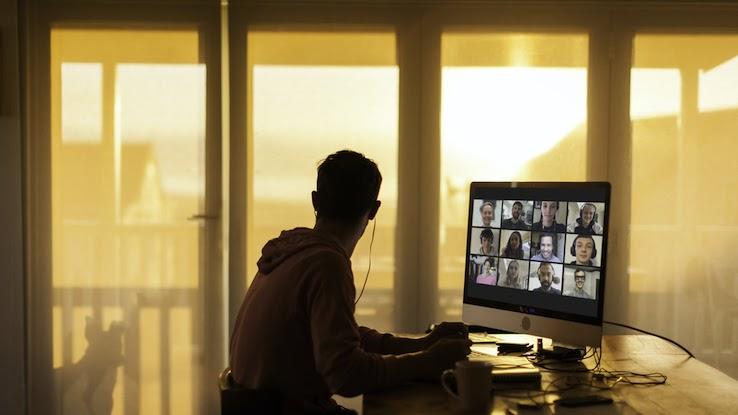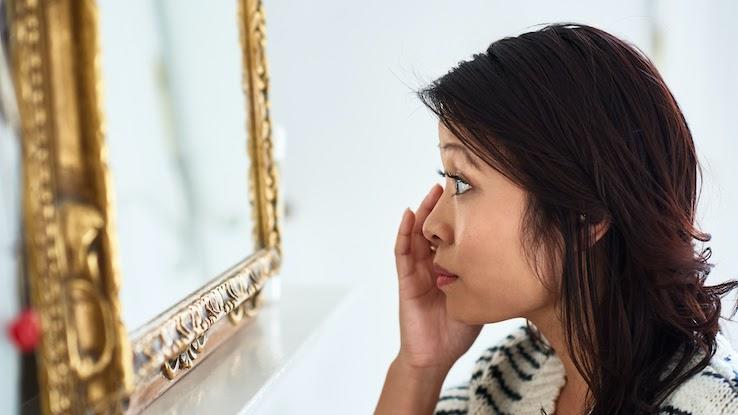How To Change The Zoom On Windows

In a March 2020 conversation with GeekWire, Zoom's Chief Executive Officer Eric Yuan described what he believed would be a permanent and fundamental shift in the ways nosotros work: using video for remote worker collaboration. People worldwide accept seen the chore-related impact of Zoom and similar meeting technologies every bit these tools have become essential for advice throughout the COVID-nineteen pandemic. And they've certainly been helpful for facilitating meetings with colleagues — but they may also be making a bigger touch on our mental health and well-beingness than we might've predictable.
According to the International OCD Foundation, approximately one in 50 Americans lives with a condition called body dysmorphic disorder (BDD), which affects how people feel nigh their physical appearance. People with BDD take been experiencing intensifying symptoms in the wake of the coronavirus pandemic, in part because spending and so much fourth dimension on camera in virtual meetings is making it easier to fixate on the way we await. Simply how exactly does this condition chronicle to Zoom calls? Information technology turns out that people who've been spending more time than ever in video conferences are showing some of the symptoms of BDD, leading to an effect some health experts are colloquially calling "Zoom dysmorphia."
As Zoom meetings and other video-based interactions get increasingly mutual and in-person interactions abound rarer, nosotros're spending a lot more time staring at people'due south faces — and realizing that they're spending an equal amount of fourth dimension seeing ours. Rates of self-image insecurity, BDD and mental health challenges are increasing, and our regularly scheduled online appearances may have something to do with it — so much and then that "Zoom dysmorphia" was coined to draw the mental wellness effects we're experiencing from looking at our perceived flaws on camera and wanting to change them. Whether you apply Zoom for fun or for work, here's what you need to know about the miracle.
What Is Body Dysmorphia?
BDD is a mental health status that causes someone to become broken-hearted about or obsessed with something they perceive is a physical flaw somewhere on their body. In some cases, the perceived flaw exists but is minor and other people don't observe it. In other cases, the flaw is imagined and doesn't be at all. In both cases, someone with BDD believes the flaw is severely exaggerated. They so develop a "distressing preoccupation" with their physical advent and the specific body office they focus on, notes the Feet and Low Association of America. This obsession with the perceived flaw can cause someone with BDD to avoid social situations because they feel ashamed and anxious.

Co-ordinate to the Cleveland Clinic, BDD sometimes occurs with other mental health conditions, such as eating disorders, anxiety disorders and obsessive-compulsive disorder. BDD affects people of all genders and ages, and it typically arises in someone's teens or early developed years. Because BDD is often comorbid with like mental health bug, people who alive with this disorder frequently develop compulsive behaviors involving their appearance. They might frequently look in mirrors or avoid mirrors altogether, or they may spend hours a day grooming themselves in an effort to minimize their perceived flaws, which they believe others will focus on.
What Is Zoom's Role in Torso Dysmorphia?
In an August 2020 Vogue article titled "How Staring at Our Faces on Zoom Is Impacting Our Self-Image," Dr. Hilary Weingarden, a BDD expert at Massachusetts General Hospital, described some of the unique challenges that people with BDD have begun dealing with more than frequently in the historic period of Zoom interactions. "We're hearing that [patients are] condign fixated on worrying nigh their own appearance during [a] call; getting stuck fixing their advent for the call by changing their makeup, lighting or photographic camera angle; and getting distracted during the call by comparing their appearance to others."

While these Zoom-induced fixations are impacting people with BDD at worrying levels, they're also affecting people who don't have BDD but who nevertheless feel dissatisfaction with their appearance. This doesn't mean that there's something "incorrect" with having a desire to put your best face frontward during an online coming together. Just this fixation can become harmful when it doesn't subside. As it becomes more pervasive, focusing on your appearance during video conferences can pb to a distortion of your self-image and undermine your mental wellness.
Every bit Dr. Weingarden explains, "Over-focusing on your advent for prolonged periods of time can actually misconstrue your perceptions so that you're no longer actually seeing yourself clearly." At its nearly mild, this "Zoom dysmorphia" can disrupt our focus a footling during a coming together. But as it continues, information technology can cause us to experience increasingly negative emotions most ourselves — negative emotions that nosotros internalize to a signal that we feel the need to modify our appearance.
Plastic Surgery Is Also Experiencing an Unprecedented "Zoom Boom"
Plastic surgeons in the U.s. and around the earth accept reported a spike in requests for surgical procedures during the COVID-19 pandemic, which may relate to the increased employ of Zoom. A December 2020 article in The Washington Post cited the experience of plastic surgeons in Cincinnati, Beverly Hills and New York who reported spikes in inquiries nigh and requests for Botox and Xeomin injectables and fillers to eliminate wrinkles, along with eyelid lifts, nose jobs, facelifts and procedures that focus on patients' necks and jawlines.

Some of the surgeons attributed the requests to people paying more attention to their ain advent due to the utilise of Zoom. The Cincinnati-based plastic surgeon elaborated, noting, "During the virtual consultations, nine out of 10 people commented about noticing these things over Zoom." Nevertheless, the spike in demand has likewise been attributed to the fact that people who were already interested in plastic surgery had more time on their hands while isolating at dwelling — where they had the option to heal privately.
The "Zoom Boom" phenomenon isn't entirely Zoom's error, nor is it totally COVID-19-related. A paper titled "A Pandemic of Dysmorphia: 'Zooming' Into the Perception of Advent" noted that 72% of members of the American Academy of Facial Plastic and Reconstructive Surgery reported doctors were seeing patients who wanted plastic surgery to amend their appearance in selfies in pre-COVID 2019. The phenomenon was and then meaning that it was dubbed "Snapchat dysmorphia" in reference to that app's characteristic-altering filters and users' want to look like filtered images of themselves.
Unlike Snapchat and its wide array of filters, though, Zoom tends to give a more than accurate picture of one'southward truthful appearance — for better or worse. That might be one reason why the aforementioned newspaper reported a spike in Google searches for terms like "acne" and "hair loss" during the pandemic. Either way, the Zoom Boom appears to exist an extension of a moving ridge of digital-induced dysmorphic tendencies related to seeing ourselves on screens.
Beat Zoom Gloom With These Tips for Boosting Your Mental Wellness
While social media apps and video-conferencing platforms can have negative effects on users' mental health and self-image, they're also essential for helping usa connect with friends, family and coworkers during this stressful fourth dimension. Being intentional and careful about using these technologies is of import, of course, but quitting them altogether could exist harmful in entirely dissimilar means. Here are a few tips psychotherapist Dr. Annette Nunez and social worker Alyssa Mancao shared with MindBodyGreen most using Zoom in a fashion that protects your cocky-image:

The quickest and simplest solution? Turn off the photographic camera. If no 1 else can see you, y'all may be less concerned about your advent and the manner y'all look to others.
Get out your camera on, but embrace your own prototype on the screen with a pasty note. It'll keep you from examining yourself and then closely and encourage you to appoint with anybody else instead.
Develop some positive affirmations to support yourself. Use them in what psychotherapist Annette Nunez calls "mirror piece of work." This involves looking at your reflection in a mirror and repeating positive statements about yourself several times a twenty-four hour period.
If you find negative thoughts at the end of a Zoom meeting, write them down then you can understand any idea patterns that are affecting you. Identifying them might help yous to understand them and fifty-fifty bring them under control.
Are yous jumping onto a Zoom call? Don't spend your last few minutes before the call scrolling through social media. Seeing filtered photos of other people and comparing yourself to them can impact your mood.
Source: https://www.ask.com/culture/zoom-dysmorphia-how-affect-well-being?utm_content=params%3Ao%3D740004%26ad%3DdirN%26qo%3DserpIndex
Posted by: martinfelainum51.blogspot.com

0 Response to "How To Change The Zoom On Windows"
Post a Comment